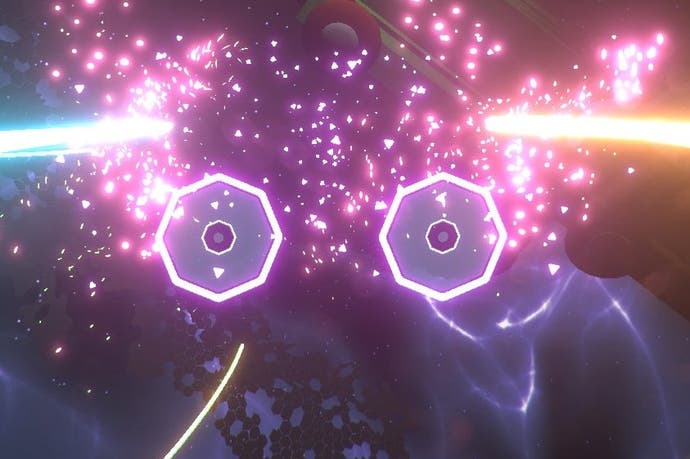Laserlife review
Flat lines.
If there's one thing Laserlife can't be accused of it's a lack of ambition. Where most rhythm games are content to let their artfully weaved beat matches do the talking, this game wants to say something grander. The story begins with a long-dead astronaut floating through space until it encounters you, an alien intelligence with the means to reconstruct the lost memories of the fallen explorer. Through the unravelling of the traveller's past, we remember what it means to be a human - or so the pitch goes.
What Laserlife is really about for the most part is manipulating two flowing tendrils - one bound to to the left stick, the other to the right - through a series of often paired nodes as you ride on rails through a collection of geometrically garish 3D spaces that represent each of the spaceman's memories. Sadly, it's a challenge that's not well suited to the control scheme.
It's not that the task at hand is too hard, necessarily, it's just that during Laserlife's more ambitious moments the game simply isn't all that fun to work through, and work is exactly what it feels like at times. The process of angling your thumbs to their most extreme degrees, sweeping them around, and coordinating all of this with the inherently spongy engagement of the trigger buttons actually becomes quite painful, quite quickly - certainly on the Xbox controller.
Once the game starts firing these beats off in rapid succession - your thumbs working at polar opposites from one another - it becomes far more of a physical challenge than you suspect was ever intended. That you can scrape through to the next stage of the game with even the humblest of performance ratings betrays, I think, a little of the developers' own low confidence in how well this is all coming together.
There are hints of something much more satisfying - and more naturally suited to the very specific control system - scattered here and there throughout Laserlife's handful of hours, and it's hard not to wish that these strengths had been played to with greater confidence. The penultimate phase of each memory, for example, has you steering both lines in tandem through the gaps in a series of walls that race towards you - a fun game of quick wits. Later on, towards the game's conclusion, you'll find yourself having to grasp and then hold onto objects that appear on your timeline, or grab and then sweep something else across the screen in a particular direction.
These latter manipulations in particular don't just provide variety and a richer, off-beat relationship with the soundtrack, they quite simply take some of the physical load off too, and give your poor old thumbs a moment of respite. During these better moments, Laserlife also comes so much closer to that state of absolute harmony that blossoms between you and the very best rhythm games. As you synchronise perfectly with one another in the immediate moment, something else in your gut is adding mental half-beats in order to anticipate the designer's next devious curve-ball, predicted logically enough from previous patterns.
It's very hard to feel Laserlife's beat-matching deep down in your bones though, and a large part of that can be attributed to what is a rather forgettable ambient soundtrack that's punctuated only by the shy and whispered strike of a hi-hat that signals each of your successful matches. What connection there is to be found between you and the game is a fragile thing indeed, and there's little motivation to work harder at the relationship.
So, there's nothing about Laserlife that doesn't work in the most fundamental sense of game design, and yet after finishing it I felt... well, just rather glad to have finished it. I know now that even spacemen once loved teddy bears and sometimes wished they were there, but I also know that the journey matters more than the destination, and Laserlife's is one that's hard to justify seeing through to its conclusion.










